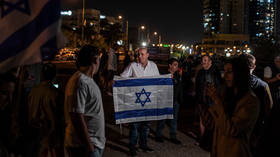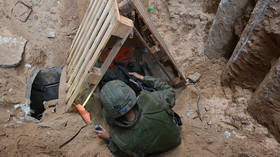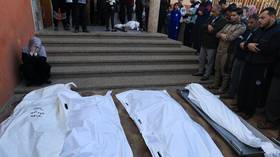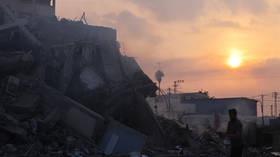The Gaza truce is a sign that Hamas can’t be defeated

After repeatedly rejecting a truce with Hamas and labeling the idea “ridiculous”, Israel agreed to a four-day cessation of hostilities in Gaza and a prisoner exchange. Six weeks of death and destruction, which Israeli and Western leaders declared should have led to the destruction of Hamas, have now bolstered the Palestinian movement's image throughout the Arab world and beyond.
The four-day truce that was implemented this Friday provided a sigh of relief for those most affected by the war in the Gaza Strip, but has in many ways spelled disaster for the Israeli government. As women and children, held captive by both Hamas and Israel, are being reunited with their families, the threat of further warfare looms. Although the loved ones of those released are now celebrating, the next steps will be crucial in determining the final outcomes of the 46-day battle that has now been placed on pause. At this time, it appears that the idea that “Hamas must go” is no more than a pipe dream.
On October 27, the United Nations General Assembly passed a resolution to the sound of overwhelming applause, calling for a truce to stop the fighting in the Gaza Strip. Although the non-binding resolution passed with a majority of 120 votes in favour, Israel and the United States outright rejected it. Tabled by Arab nations, the call for a truce was labeled as a “defense of Nazi terrorists” by Gilad Erdan, Israel’s ambassador to the UN. This came after Hamas released four Israeli civilian hostages without conditions, for what the group said were humanitarian reasons.
Israeli Prime Minister Benjamin Netanyahu and others in his emergency war government, have repeatedly stated their goal of crushing Hamas and allied Palestinian armed groups in Gaza, refusing to negotiate with them. The six-week-long aerial bombardment of densely populated civilian areas in the besieged Palestinian enclave, which also morphed into a ground war, has claimed over 20,000 lives according to some estimates, but failed to eliminate Hamas. In fact, Israeli forces have not been able to show a single significant military achievement against the Palestinian armed groups. While Hamas claim to have struck 355 Israeli military vehicles during the past two weeks of fighting, publishing video evidence of dozens of attacks, Israeli forces have failed to assassinate senior leaders of Hamas, to free hostages by force, uncover major tunnel networks, or even publish proof that they have killed a significant number of Hamas fighters on the battlefield.
According to the Calcalist financial newspaper, the Gaza war was estimated early on to cost around $50 billion, roughly 10% of Israel’s GDP. In addition to this, the Israeli military has reportedly suffered losses in intelligence and monitoring equipment along their northern border, due to attacks carried out by the Lebanese group Hezbollah. Yemen’s Ansarallah also seized a ship in the Red Sea, owned by an Israeli businessman, which has severely impacted trade through the southern port city of Eilat. This is not factoring in the inevitable long-term effects on things like Israel’s tourism sector or investment in its high-tech industry.
On top of this, we have seen immense pressure being placed upon US forces throughout Syria and Iraq, with daily attacks occurring against their military facilities, for the sole purpose of pressuring Washington to force an end to Israel’s attacks on Gaza. Across the Arab World, the general public is also boycotting Western products on an unprecedented scale, in particular companies like McDonalds that have shown support for the Israeli army. The blatant double standards of the collective West’s political and economic elites, as well as the establishment media, are also being severely criticized, as the likes of the BBC are feeling the heat for biased reporting on the issue of Palestine-Israel.
Instead of facing the wrath of the whole world and getting crushed, Hamas has not only survived, but is becoming more popular. While US President Joe Biden’s administration provided excuses for Israel’s invasions and bombings of hospitals in the Gaza Strip, claiming that Hamas has maintained a significant presence in places like the recently-raided al-Shifa Hospital, the world has risen in outrage against the atrocities Israel has committed in the Palestinian territory. UN relief chief, Martin Griffiths, has called the humanitarian catastrophe in Gaza “the worst ever,” and it's seen as a direct result of the US having drawn “no red lines” for Israel’s behavior in Gaza.
Meanwhile, Hamas scores victory after victory, from a guerilla warfare and political perspective, while its military capabilities appear to have been undiminished so far. The Qassam Brigades, the armed wing of Hamas, that launched their attack on Israel on October 7, have managed to shift the world's attention back on the issue of Palestine, have freed political prisoners held in Israeli detention, while inflicting blow after blow against one of the most powerful military forces in the world.
Since the Kerry Peace Plan, which was a failed initiative set forward under the administration of Barack Obama, the US government has not made any real effort towards creating a viable Palestinian state. In fact, until October 7, nobody was talking about a Palestinian state, the focus was instead on the issue of Saudi-Israeli normalization. It was clearly the shared belief of the Israeli and US governments that Hamas could be contained with the periodic issuance of Qatari aid grants, while the Palestinian Authority was to be strengthened only to deal with a number of militias that have formed in the West Bank over the past two years. Today, the whole world is talking about the formation of a Palestinian state. There is also the notion of bringing the Palestinian Authority into power in the Gaza Strip, which would essentially mean the lifting of the 17-year economic blockade that the West has imposed on it. The issue of protecting the status-quo at Al-Aqsa Mosque in Jerusalem is also on the regional agenda in a serious way, while the government of Benjamin Netanyahu veers towards collapse.
If Israel and its Western backers choose to escalate the conflict further instead of finding a peaceful settlement, the war threatens to extend into a broader regional conflict; a threat to the stability of all nations involved. The pursuit of a ceasefire agreement can usher in a new era in the conflict, one in which Hamas will remain. Peace is in the interests of the entire region, we have seen what the Israeli army has to offer and it has not resulted in the defeat of Palestinian armed groups, it has only scored a blow against civilians in Gaza. This will be a hard pill for the Western governments to swallow, but the only solution to safeguarding civilian life and securing the release of all prisoners, will be through a peaceful resolution, not through more violence.
The statements, views and opinions expressed in this column are solely those of the author and do not necessarily represent those of RT.
























